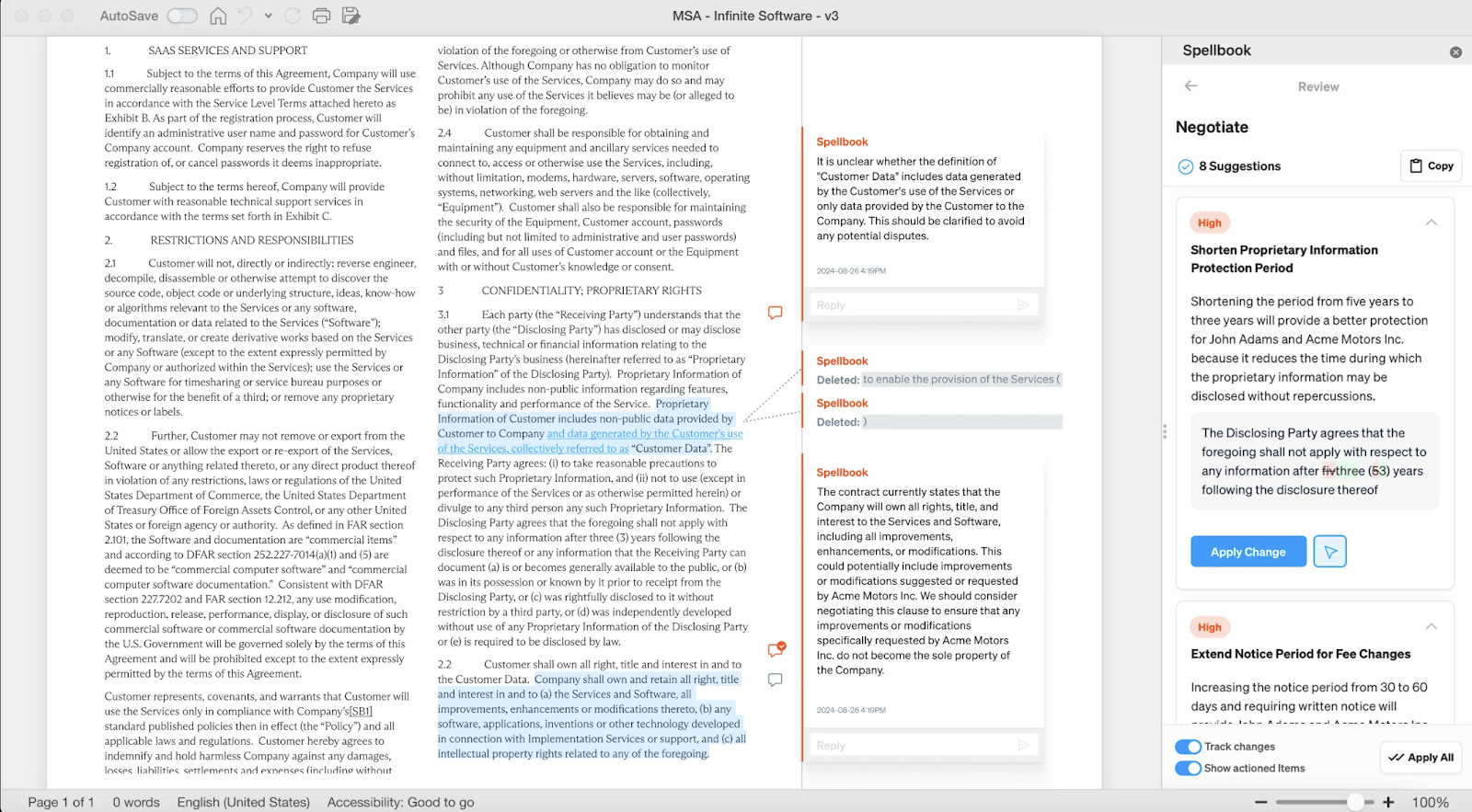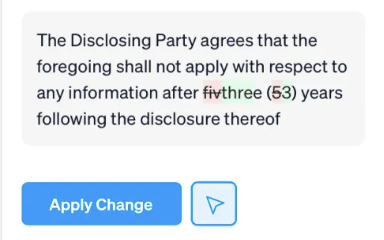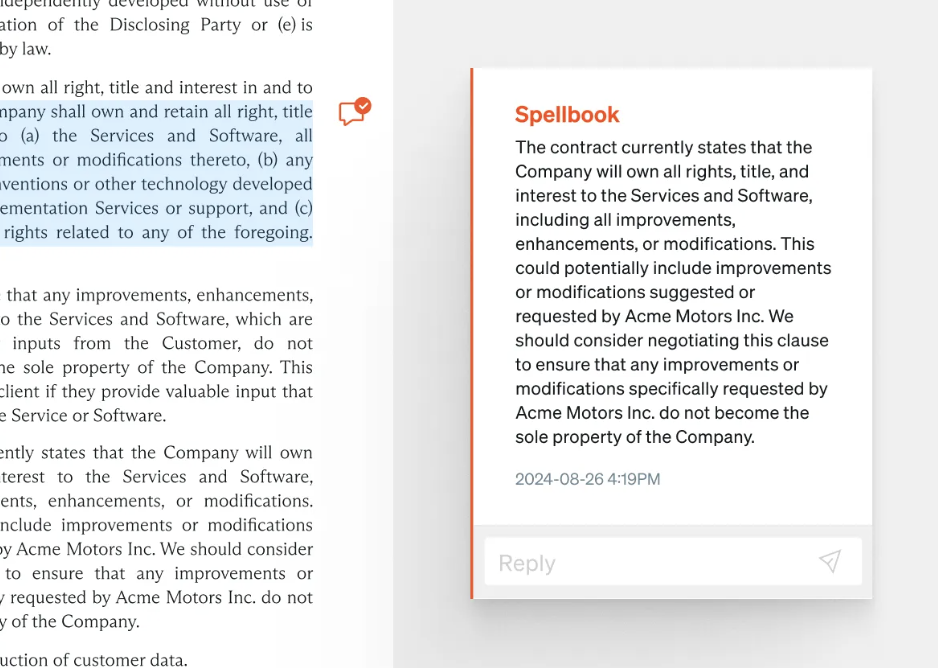
How to Use AI for Legal Document Analysis

If you’ve ever spent hours reviewing contracts, you know how tedious and time-consuming legal document analysis can be. One overlooked clause may lead to disputes, compliance risks, or a costly disaster.
What if AI could help prevent contract review errors and risks?
AI legal document analysis tools turn contract review into the easiest part of your day. That’s because AI can instantly identify key clauses, flag potential issues, and ensure compliance with legal standards.
If you use AI, you don’t have to manually scan dense legal texts anymore. AI is here to help you. In this guide, you’ll see how AI streamlines legal document analysis, why AI is a must-have in the legal industry, and how you can integrate it into your workflow.
Types of Legal Documents Analyzed by AI
Reviewing legal documents manually can be tedious and time-consuming. AI legal tools can provide an extra set of eyes, helping you review a contract as quickly as 26 seconds. It’s like having a star paralegal by your side when drafting or reviewing legal documents.
Legal documents that AI writing tools can analyze for you include:
- Contracts: Review employment agreements, vendor contracts, and service agreements
- Compliance Reports: Ensure documents align with legal and regulatory requirements
- Corporate Governance Documents: Analyze board minutes, shareholder agreements, and company policies
- Mergers & Acquisitions (M&A) Documents: Scan purchase agreements and financial reports
- Non-Disclosure Agreements (NDAs): Ensure confidentiality and verify confidentiality terms
- Real Estate Lease Agreements: Identify compliance gaps, risk areas, and opportunities for negotiation
{{cta-surprise-red}}
How to Use AI to Review Different Legal Documents
AI simplifies legal document review by quickly spotting risks and ensuring accuracy. This section explains how lawyers, including patent attorneys, corporate lawyers, and real estate attorneys, can use AI to review multiple legal documents, saving time and increasing efficiency.
Review Contracts and Legal Agreements
AI legal document analysis tools such as Spellbook can scan contracts in seconds and highlight key clauses, obligations, and potential risks for your attention.

Spellbook also flags missing or non-compliant clauses based on relevant legal benchmarks and regulatory standards. It highlights and explains its recommended revisions, allowing you to understand and verify its reasons for them.
Spellbook can do around 70% of the work for you in document review, potentially saving you about 12 hours a week.
Legal Document Review in Mergers and Acquisitions
AI for legal documents accelerates M&A review by instantly scanning thousands of pages of M&A records.
Spellbook’s contract review feature can scan purchase agreements, financial reports, and regulatory filings. It will flag non-compliant clauses and cross-check your documents against applicable industry-specific rules and regulatory requirements.

It’s a “click to revise” feature that speeds up your review process. It also integrates directly with Microsoft Word, making it highly convenient and user-friendly.
AI is a helpful second (or third) set of eyes when reviewing M&A documents, ensuring you don’t overlook important details.
Non-Disclosure Agreements (NDAs)
Would you let your client sign a one-sided NDA? AI ensures you don’t.
NDAs are useful for safeguarding sensitive information. But what if there’s a loophole? A vague confidentiality clause? An omitted non-compete provision? These issues can create significant risks.
In 2016, a poorly worded confidentiality agreement led to a high-profile dispute at Tesla. The agreement’s overly broad terms created legal uncertainty and potentially infringed on employee rights.
AI legal document analysis tools, such as Spellbook, find and highlight issues like these to help you better evaluate your NDAs and mitigate legal risk.

Spellbook detects inconsistencies in legal text and highlights one-sided clauses that may cause future problems.
Service Agreements
Service agreements help set clear expectations and build strong business relationships. Vague agreements that lack precise obligations leave room for misinterpretations and disputes.
You're familiar with the saying that' the customer is always right'? Not when you have proper agreements. Imagine a marketing agency and a client agreeing to a content campaign. If their agreement lacks revision limits, disagreements can arise when the client demands changes after changes.
AI tools such as Spellbook use advanced algorithms to help you draft and review service agreements quickly. They automatically structure agreements appropriately and flag vague language, inconsistencies, and missing protections. You avoid the stress and frustration of a service agreement with missing terms.
Real Estate Lease Agreements
Real estate lease agreements contain complex details, financial obligations, and legal risks. Suppose you’re reviewing a commercial lease for a client, and everything looks fine until AI flags a landlord-friendly escalation clause buried on page 18.
AI ensures you don’t miss that detail. You can ensure your client isn’t locked into steep annual rent increases. AI assesses legal obligations and rights and evaluates contract terms, helping you avoid potential legal disasters. That’s fewer surprises and better negotiations for your client.
Benefits and Challenges of Using AI for Legal Document Analysis
AI has advantages for lawyers, but it also has risks. Here are several of its pros and cons:
Benefits
- Increased Efficiency – AI summarizes lengthy legal documents. It also automates contract review, clause extraction, and redlining. This cuts hours of manual work down to minutes.
- Cost-Effectiveness – AI reviews large volumes of legal data quickly. That means fewer hours spent on repetitive tasks, so you can allocate resources more effectively.
- Improved Accuracy and Consistency – AI highlights critical legal points and scans documents for specific clauses. You can easily catch inconsistencies and missing clauses that might go unnoticed if you’re reviewing manually.
- Regulatory Compliance – AI cross-checks documents against legal and regulatory standards to reduce compliance risks.
- Enhanced Risk Assessment – AI flags potential legal risks and issues. You can immediately identify unfavorable terms, liability risks, and potential negotiation opportunities.
Challenges
- Data Privacy Issues – Legal documents often contain sensitive client information. Use tools with encryption and security protocols that prevent unauthorized access.
- Training Data Quality – AI must be trained on extensive, high-quality legal datasets to accurately comprehend the legal context and nuances of legal language. Without the proper training, AI may offer biased, outdated, or incomplete responses.
- AI Hallucinations & Misinterpretations – Sometimes, AI doesn’t understand context as well as humans do. It may misinterpret highly ambiguous language or suggest inaccurate conclusions.
Key Takeaways
- AI can help you analyze contracts, compliance reports, agreements, and other legal documents faster than manual reviews.
- AI can automate manual tasks, reduce costs, and free up your time for higher-value activities.
- AI also presents challenges, so be sure to select high-quality AI software to minimize risks.
{{cta-surprise-red}}
Frequently Asked Questions
Is AI Reliable for Legal Document Analysis?
Yes, but you still need to double-check its responses. AI tools are highly reliable for extracting clauses, identifying risks, and conducting compliance checks. But AI can only complement, not replace, your legal expertise and professional judgment.
Can AI Improve the Quality of Legal Document Review?
Yes. AI can provide a consistent and highly accurate analysis. It catches inconsistencies, missing clauses, and compliance gaps. AI gives you an extra set of eyes when reviewing legal documents, helping to improve the quality of legal document review.
Are Free AI Legal Document Analysis Tools Effective?
Not for professional use. Free AI tools often lack specialized legal-specific training, robust security features, and comprehensive compliance checks. Paid tools such as Spellbook offer higher accuracy, enhanced risk detection, and secure, law-focused AI models.
Thank you for your interest! Our team will reach out to further understand your use case.






